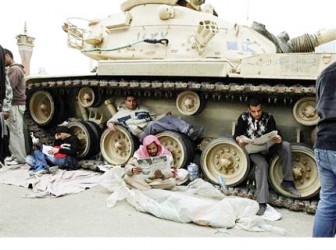CAIRO, (Reuters) – U.S. President Barack Obama said yesterday talks to resolve Egypt’s crisis were making progress, but the main Islamist opposition in Cairo said it could quit the process if protesters’ demands were not met.
Obama’s comments seemed to contradict those by Egyptian opposition figures who reported little progress in talks over demands including the immediate exit of President Hosni Mubarak.
“Obviously, Egypt has to negotiate a path and they’re making progress,” Obama told reporters in Washington.

Protesters barricaded in a tent camp in Tahrir Square in the heart of Cairo have vowed to stay until Mubarak quits and hope to take their two-week campaign to the streets with more mass demonstrations today and Friday.
Many young men dismissed the political dialogue taking place.
The United States has urged all sides to allow time for an “orderly transition” to a new political order in Egypt, for decades a strategic ally. But protesters worry that when Mubarak does leave, he will be replaced not with the democracy they seek but with another authoritarian ruler.
The opposition has been calling for the constitution to be rewritten to allow free and fair presidential elections, a limit on presidential terms, the dissolution of parliament, the release of political detainees and lifting of emergency law.
“We are assessing the situation. We are going to reconsider the whole question of dialogue,” the Brotherhood’s Essam el-Erian told Reuters. “We will reconsider according to the results. Some of our demands have been met but there has been no response to our principal demands that Mubarak leave”.
The potential rise to power of the banned Muslim Brotherhood, widely seen as by far the best organised opposition group, troubles Egypt’s Western allies and neighbour Israel, which has a peace treaty with the Arab country.
Obama said on Sunday the Brotherhood lacks majority support.
On Monday the White House expressed concern about the group’s “anti-American rhetoric”, but stopped short of saying it would be against the group taking a role in a future government.
“We have significant disagreements (with the Brotherhood),” White House spokesman Robert Gibbs told reporters.
Mubarak, 82, who refuses calls to end his 30-year-old rule before September polls, saying his resignation would cause chaos in the Arab world’s most populous nation, has tried to focus on restoring order. His government seems to be buying time.
Keen to get traffic moving around Tahrir Square, the army tried early yesterday to squeeze the area the protesters have occupied. Overnight campers rushed out of their tents to surround soldiers attempting to corral them into a smaller area.
The powerful army’s role in the next weeks is considered critical to the future of Egypt.
“The army is getting restless and so are the protesters. The army wants to squeeze us into a small circle in the middle of the square to get the traffic moving again,” protester Mohamed Shalaby, 27, told Reuters by telephone.
The uprising, which some activists have called the “Nile Revolution”, may have cost 300 lives so far, according to the United Nations.
The presence at the weekend talks of the Muslim Brotherhood, whose members have for years been repressed by Mubarak’s feared security forces, was a significant development that would have been unthinkable before the uprising.





